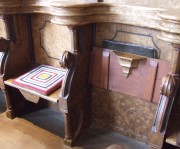|
Home
|
Jul 26, 2021
This week’s themeThere’s a word for it This week’s words misericord contrafactum akrasia aquabib eidolon 
Misericord seat
Photo: Kandschwar/Wikimedia Previous week’s theme Words that aren’t what they seem A.Word.A.Day
with Anu GargI have been diving in the dictionary for decades, but this ocean of words is so immense I get pleasantly surprised from time to time. A few weeks ago someone shared the word misericord. I was able to get a faint idea of what it might mean, but I was not prepared for all of its facets. You mean there’s a word in the English language for a place that may be, basically, a monks’ frat house? This word also means a dagger. And you can also use it for a hinged seat. Yes, yes, and yes. There’s such a word, and there is an unexpected common theme in all these senses of the word, as you’ll see below. A language is a reflection of its speakers. It expands to fill a need. If they need a word for a bachelor pad to chill out, away from the prying eyes of the abbot, who is the language to get in the way? Do your thing, it says, I’m here to make you happy. Feel free to twist me, make me play another role, whatever. No morality police here. This week we’ll share with you five words that may make you say: I didn’t know there was a word for it. Use them any way you like. A language is an ABC (abbacy?) with no humorless enforcers taking all the joy out of it. misericord
PRONUNCIATION:
MEANING:
noun: 1. Compassion, pity, or mercy. 2. Something to provide support to a standing person. 3. A place where rules are relaxed. 4. A dagger used to deliver the death stroke to a seriously wounded person. ETYMOLOGY:
From Old French misericorde, from Latin misericordia (pity or mercy), from misereri
(to pity) + cor (heart). Ultimately from the Indo-European root kerd-
(heart), which also gave us cardiac, cordial, courage, concord,
cordate,
accord, discord, record, and
recreant. Earliest documented
use: 1230.
NOTES:
If you were to summarize misericord in plain words, it would be a
mercy, a mercy seat, a mercy room, and a mercy weapon.
A misericord was built under a church seat for worshipers to support
their bottoms when standing (a small
projection from the underside of a hinged seat that can be used for
support when the seat is turned up). Since a misericord under a seat was usually
out of sight, it was an inviting proposition for the woodcarver to depict
something naughty, subversive, or forbidden. Examples: The fact that a misericord supported the undersides of a person during long homilies probably inspired many a scene of mooning. A misericord in a monastery, on the other hand, was not just a seat, but a whole room or an apartment where rules were relaxed. One could eat what was forbidden in the regular refectory. Another word for a refectory is frater and the misericord was called flesh-frater. So it was a frat house, in a manner of speaking. A flesh-frater? See the usage example below. Finally, misericord as a mercy weapon delivered the death stroke (also known as the mercy stroke or coup de grâce) to hasten the death of a mortally wounded person. USAGE:
“Roddy chose a tapestried stool as a misericord, uncomfortable enough to
avert the danger of relaxing.” David Stuart Leslie; Two Gentlemen Sharing; Secker & Warburg; 1963. “‘By St. Loy!’ Joan cried suddenly. ‘We’ll pleasure ourselves now. Will you take ale, lady, in the misericord?’ Sweeping with mockery, she led me, while the following shadows loomed behind, down a low passage with a dim, fanned roof and gilded bosses. ‘A shapely building, this,’ I murmured.” Rosemary Hawley Jarman; We Speak No Treason; Little, Brown; 1971. “He kept his enemy in sight as his fingers searched frantically for the misericord fastened to his swordbelt.” Tara O’Dell; My Gallant Knight; Zebra; 1999. A THOUGHT FOR TODAY:
Better keep yourself clean and bright; you are the window through which you
must see the world. -George Bernard Shaw, writer, Nobel laureate (26 Jul
1856-1950)
|
|
Subscriber Services
Awards | Stats | Links | Privacy Policy
Contribute | Advertise
Awards | Stats | Links | Privacy Policy
Contribute | Advertise
© 1994-2025 Wordsmith